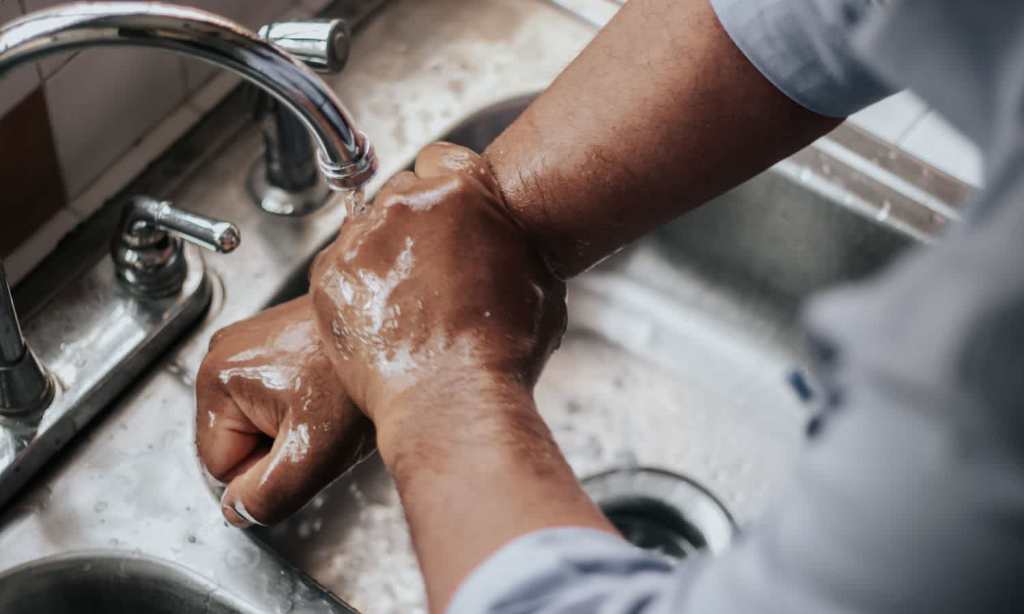The emphasis on handwashing is intense at the moment (because, well, you know!) but the most shocking part of this whole handwashing situation is the anecdotal evidence that shows how many people *didn’t* wash their hands regularly throughout the day before the COVID-19 pandemic became a concern.
That somewhat shocking realisation aside, if your hands look anything like mine, they are pink and raw from soap and sanitiser. So, if you’re in the same boat, here’s how to give your hands some TLC.
Because this is just how life works, the very soap we’re using to scrub our hands can also be damaging to the skin barrier that protects us.
“Whether it be the rapidly escalating corona pandemic or just any given winter, handwashing is one of the most effective ways to prevent the transmission of infections,” Dr. Adam Friedman, professor of dermatology at George Washington School of Medicine and Health Sciences, told Healthline.
“Unfortunately, the very soaps and even wringing of hands underwater will also break down the barrier we are trying to protect.”
So, here are a few tips on how to save your poor hands.
Use a moisturising soap
While there is nothing wrong with opting for those orange or green coloured anti-bacterial pump soaps, switching to something more moisturising could be helpful (if you can get your hands on it at the supermarket!). Keep an eye out for a creamy-looking liquid soap or anything filled with lanolin or glycerin.
And, if you can, try to avoid using bar soap as it’s not a fun time for dry hands.
“The binders that hold a bar of soap together naturally have a high pH, which will cause unnecessary dryness,” Renée Rouleau, skincare expert and aesthetician, told Healthline. Instead, choose liquid soaps since they are generally less drying to the skin,”
But, if bar soap is all you currently have in the house, still continue to use it as bar soap is better than no soap at all!
Use warm water when washing
Hot water can be super drying and scalding for your skin, so use warm water when hand washing. According to research, the temperature of the water doesn’t really make a difference in killing germs,so you don’t need to be using super hot water for that reason.
So, avoid drying out your hands even further and use lukewarm water instead!
Do an overnight hand mask
A hand model by the name of Susan Schell recently told Byrdie that she treats herself to an overnight hand mask the night before a photoshoot as it leaves results in super soft skin.
“I generously slather my hands in lotions, as well as the all-important cuticle oil, and then slip my gooey hands into cotton overnight gloves,” Schell told Byrdie.
Much like a sheet mask, wearing a pair of cotton gloves over freshly moisturised hands will provide a big dose of much-needed hydration.
Slather on moisturiser
Rouleau also recommends popping on a light layer of hand cream straight after handwashing to lock in some moisture.
“The reason is that water acts like a magnet and it will attract water out from the deepest layers of the skin and evaporate into the dry air. The result is even tighter, drier skin,” she told Healthline.
“To prevent this from happening, be sure to immediately apply hand cream afterward. Even a light layer will do.”
Look out for the following ingredients in your hand cream as these will help protect the skin barrier: lanolin acid, squalene, lactate and mineral oil are only a few.
This hand cream by Aesop is filled with emollients, which are vital in providing hydration and protecting hands.
When it comes to using hand cream after hand sanitiser, wait 10 minutes before applying. According to the formulations team at Go-To, applying cream straight after sanitiser can neutralise the sanitisers effectiveness, which no one needs right now.
https://www.instagram.com/p/B-G7KjlnYAI/
Blot dry hands
Roughly wiping your hands with a towel can cause tiny abrasions on the skin, further damaging already sore and raw hands. So, opt for a blotting approach instead of rubbing.
“Paper towels are best, but if you use cloth, each person in a home should have their own towel and towels should be replaced with clean ones every 3 days,” Rouleau told Healthline. “Make sure hands are thoroughly dried, as germs are more easily transferred on wet hands.”
Despite the pain, please keep on washing your hands!
Wash your hands frequently with soap and water, before and after eating, and after going to the toilet. And, don’t forget to lather up your hands for at least 20 seconds (paying particular attention to your wrists, nails and back of your hands) before rinsing.
The current health crisis is evolving rapidly. If you suspect you or a family member has coronavirus you should call (not visit) your GP or ring the national Coronavirus Health Information Hotline on 1800 020 080.







